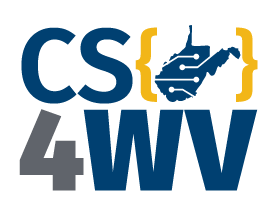West Virginia is a pioneer in creating a Computer Science K-12 pathway for all students with a special emphasis on expanding to elementary schools and K-12 schools in a rural setting. WV’s innovative approach requires the WVBE to adopt a policy detailing the appropriate level of CS instruction at each educational level. Senate Bill 267 charged WVDE with creating a plan to reach all WV students with Computer Science. This law makes WV one of the first states to require all students to start their CS education in elementary school and be exposed to a variety of CS experiences throughout their K-12 career.

Educators
Training
Computer science training for educators is available for all WV educators who can demonstrate that they will be teaching computer science in the coming school year.
Computer science training is available for WV educators through CodeWV. CodeWV has solutions for educator training through Code.org’s Curriculum as well as a WV-created curriculum that maximizes that capabilities of the many Apple devices in WV Schools. Please contact CodeWV for training opportunities. Other organizations in the state, such as the NASA IV&V Educator Resource Center (ERC), provide training opportunities for educators in coding and robotics, in additional to other technologies.
Credentialing
WVDE has created a series of authorizations for educators who complete training and provide evidence of computer science instruction in their classroom. While at this time a computer science authorization or endorsement is not required to teach computer science in West Virginia, Policy 5202 outlines three options for Computer Science Authorizations for educators. Read the policy, or explore the authorizations.
Standards
WVBE adopted Policy 2520.14, the West Virginia College- and Career-Readiness Standards for Technology and Computer Science, in July of 2019. These standards apply to all students. Information regarding the manner in which these standards are to be implemented is outlined in WVBE Policy 2510.
At the elementary level, the Computer Science standards are intended to be integrated with other content areas. In middle school, the standards are designed to be integrated with other content areas or taught as a single course such as Discovering Computer Science. In high school, at least one computer science is required to be offered.
Praxis
While a computer science endorsement is not required to teach computer science in West Virginia, the Computer Science Praxis Exam for Computer Science Education (5652) is offered to educators that already hold West Virginia Certification in another content area and leads to an endorsement in Computer Science Education.
WV CSTA Chapter
Professional organizations support Computer Science Educators in WV. For additional information on these organizations, please visit the Computer Science Teachers Association (CSTA) and the newly formed CSTA-WV organization.
WV CS K12 Listserv
The WV Computer Science in K12 Listserv is used to distribute information and resources to educators. To be added to the listserv, send an e-mail to Erika Klose, eklose@k12.wv.us
Student Opportunities
Computer Science Clubs and Opportunities
- Girls Who Code (GWC) – Visit GWC and click “Locations” to locate a club, or visit GWC and click “Start a Club” to fill out your quick club’s application and indicate your affiliation with WVDE to access our partnership benefits.
- WV Coding Club – Coding club that meets virtually to reach students from across the state.
- Google CS First – Google CS First clubs meet both in school and out of school. The suggested audience is grades 3 – 8. Students will need individual computers or tablets to participate.
- CyberPatriot Elementary School Cyber Education Initiative (ESCEI)– The CyberPatriot team created a set of three fun, interactive learning modules aimed at increasing grade K-6 students’ awareness of online safety and cybersecurity principles.
Computer Science Contests
- Girls Go Cyber Start – High school girls will master new skills while working their way through a vast online training game!
- CyberPatriot – The National Youth Cyber Education Program is sponsored by the Air Force Association and Northrup Grumman.
- Congressional App Challenge– This is a coding competition for middle and high school students hosted by US Congressional representatives.
Community Engagement
Information for Adminstrators
- Computer Science Education: The requirements for Computer Science in WV schools are summarized for administrators.
- Standards: WV adopted the West Virginia College- and Career-Readiness Standards for Technology and Computer Science in July of 2019. These standards apply to all students. Information regarding the manner in which these standards is outlined in WV Policy 2510. At the elementary level, the Computer Science standards are intended to be integrated with other content areas. In middle school, the standards are designed to be integrated with other content areas or taught as a single course such as Discovering Computer Science or a county-created computer science course. In high school, at least one computer science is required to be offered.
- Computer Science in CTE: Information regarding the CTE Information Technology Cluster.
- WV CS K12 Listserv: The WV Computer Science in K12 Listserv is used to distribute information and resources to educators. To be added to the listserv, send an e-mail to Erika Klose, eklose@k12.wv.us.
For more information on the Computer Science K-12 pathway, contact:
Erika Klose
Building 6 Room 500
1900 Kanawha Boulevard East
Charleston, West Virginia 25305-0330Phone: 1-833-627-2833
Fax: (304) 558-1613
